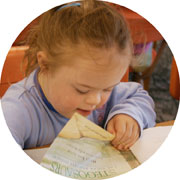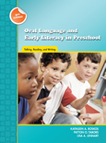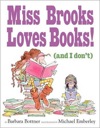Word Play All Day—Early Literacy in Action – Virtual Toolkit
Professional Development Activity
Begin by reading the Growing Ideas: Word Play All Day—Early Literacy in Action (PDF) and completing the Growing Ideas Into Action Handout (PDF) – A resource to use as you read and use the tipsheets.
Training Materials to use right away:
- Reading Aloud with Children of All Ages (PDF): article from Reading is Fundamental .
- Books, Nooks, and Literacy Hooks – video from the Center of Early Literacy Learning (CELL).
Try, Review, Reflect and Plan:
Reading Aloud with Children of All Ages explains the importance of reading aloud with young children and shares techniques for reading aloud with babies and toddlers, preschool and school-aged children. The short video, Books, Nooks and Literacy Hooks, offers suggestions on how to set up the childcare program to support early literacy learning.
- Click on the first website link above to download the PDF, Reading Aloud with Children of All Ages.
- Click on the second website link above to view the video, Books, Nooks, and Literacy Hooks.
- Try out the strategies in your program.
- Use the Word Play All Day — Early Literacy in Action Self-Reflection Guide and Documentation Sheet (PDF) to:
- Review, reflect and plan your work with children.
- Document your training hours.
Highly Recommended Resource:
Roskos, K.A., Tabors, P.O., & Lenhart, L.A. (2009). Oral Language and Early Literacy in Preschool: Talking, Reading, and Writing Second Edition. Newark, DE: International Reading Association, Inc.
NAEYC On-line bookstore annotation:
Since the first edition in 1987, NAEYC’s book Developmentally Appropriate Practice in Early Childhood Programs has been an essential resource for the early child care field. Now fully revised and expanded, the bestselling 2009 version comes with a supplementary CD containing readings on key topics, plus video examples showing developmentally appropriate practice in action. Based on what the research says about development, learning, and effective practices, as well as what experience tells us about teaching intentionally, DAP articulates the principles that should guide our decision making. Chapters describe children from birth through age 8 in detail, with extensive examples of appropriate practice for infant/toddler, preschool, kindergarten, and primary levels
Children’s Book Selection:
Bottner, B. (2010). Miss Brooks Loves Books! (And I Don’t). New York, NY: Knopf Books for Young Readers.
Book Description:
“With the help of Miss Brooks, Missy’s classmates all find books they love in the library—books about fairies and dogs and trains and cowboys. But Missy dismisses them all—“Too flowery, too furry, too clickety, too yippity.”
Still, Miss Brooks remains undaunted. Book Week is here and Missy will find a book to love if they have to empty the entire library. What story will finally win over this beastly, er, discriminating child? William Steig’s Shrek!—the tale of a repulsive green ogre in search of a revolting bride—of course!”
Interested in additional information on this topic? Visit our Word Play All Day – Early Literacy in Action Selected Resources page.
Updated: 09/27/2018



